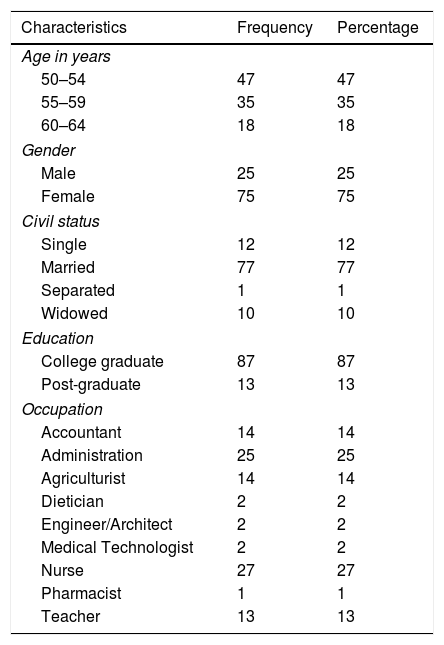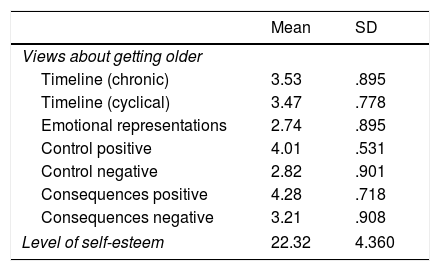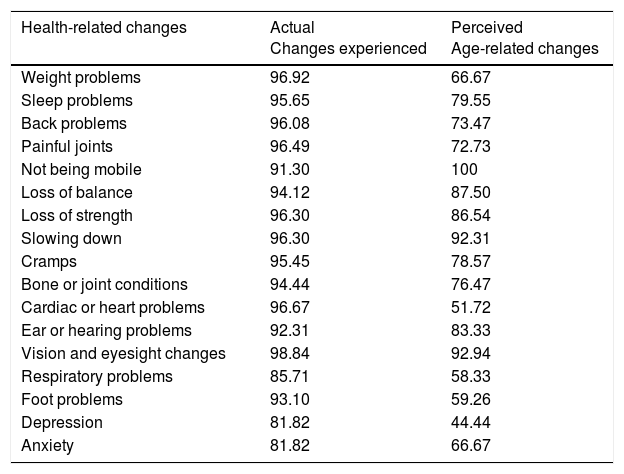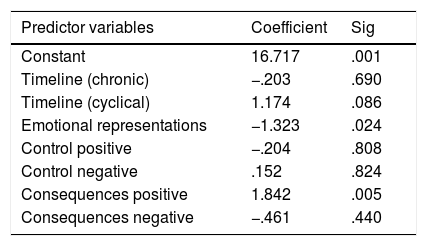This study aimed to measure the participants’ views on aging, as well as their self-esteem. More so, it sought to determine if views of getting older significantly predicts the self-esteem of professionals nearing retirement.
MethodA descriptive correlation design was used. Through convenience sampling, 100 professionals nearing retirement were recruited and asked to answer the Aging Perceptions Questionnaire (APQ) and Rosenberg Self-Esteem Scale. Frequency, percentage, mean, standard deviation and multiple regressions were used.
ResultsThe results revealed that both emotional representations and consequences positive statistically and significantly predicted self-esteem. This means that when individuals think less of the mentioned emotions, the higher their self-esteem will be.
ConclusionsThe findings of this study emphasized the importance of maintaining aged person's self-worth, identity, sense of purpose and self-esteem which are usually lost prior to retirement. It highlights the most common age-related changes usually experienced by aged person.
Aging is a progressive process that begins at birth.7 As people age, changes in their bodies occur. They experience decline in heart function; change in joint structures; decrease in bone density; their skin becomes thinner, drier, and less elastic; and their vision starts to decline.3,9,10,13,14 In fact, aside from these physiologic alterations, emotional and psychosocial changes may also occur. Aging is not only a scientific concept but also a mental construct that acts within people's cognitive systems.4 The lives of older persons may be influenced by their previous lifestyle, education, culture, perception, and beliefs6 and that there might be a decreased interaction between them and the society.2
In recent years, several studies have found that individuals who are aging may experience loss of self-worth and identity,12 as well as life dissatisfaction7,11 due to several factors such as loss of spouse,1 decrease in income,5,10 and poor health.8 This would give aged person to self-reflect and eventually transfer their authority to the younger generation.2 After a thorough search using ProQuest, EBSCOhost, Cumulative Index to Nursing and Allied Health Literature [CINAHL], Science Direct, and Gale Databases, it was found out that there is no published literature yet that correlates the views on aging and the self-esteem of individuals, specifically Filipino professionals nearing retirement. Therefore, this study aimed to measure the participants’ view on aging and this self-esteem, and see if they are related with each other.
MethodResearch designA descriptive-correlational design was used to determine if participants’ views on aging significantly predicts their self-esteem.
Sample and settingThrough convenience sampling, 100 professionals nearing retirement were recruited in this study. They are at least bachelor's degree-holders, 50 to 64 years of age, and residing within Angeles and Mabalacat city, Philippines.
Instrument and data collectionTwo instruments were employed in this study: The Aging Perceptions Questionnaire (use to assesses one's views on aging) and Rosenberg Self-Esteem Scale (use to assesses one's self-esteem).
Data analysisThe Statistical Package for Social Sciences (SPSS) version 20 was used to run both descriptive and correlational statistics. Frequency, percentage, mean, and standard deviation were used for descriptive purposes; while multiple regression analysis was used to determine if aged person's view on getting older significantly predicts the self-esteem of professionals nearing retirement.
ResultsOne hundred (100) professionals nearing retirement participated in this study. Almost half of the participants belong to the age group 50–54 years (47%) and three-fourths of them are female (75%) and are married (77%). Moreover, most of the surveyed participants are nurses (27%) and are administrative personnel (25%). Interestingly, 13% of these professionals attended post-graduate schooling after obtaining their baccalaureate degrees (Table 1).
Demographic characteristics of the participants.
| Characteristics | Frequency | Percentage |
|---|---|---|
| Age in years | ||
| 50–54 | 47 | 47 |
| 55–59 | 35 | 35 |
| 60–64 | 18 | 18 |
| Gender | ||
| Male | 25 | 25 |
| Female | 75 | 75 |
| Civil status | ||
| Single | 12 | 12 |
| Married | 77 | 77 |
| Separated | 1 | 1 |
| Widowed | 10 | 10 |
| Education | ||
| College graduate | 87 | 87 |
| Post-graduate | 13 | 13 |
| Occupation | ||
| Accountant | 14 | 14 |
| Administration | 25 | 25 |
| Agriculturist | 14 | 14 |
| Dietician | 2 | 2 |
| Engineer/Architect | 2 | 2 |
| Medical Technologist | 2 | 2 |
| Nurse | 27 | 27 |
| Pharmacist | 1 | 1 |
| Teacher | 13 | 13 |
The mean scores of the participants’ perceptions on aging and the level of their self-esteem are reported in Table 2. The participants agree that aging is a chronic phenomenon (x=3.53, SD=.895), it actually varies in nature (x=3.47, SD=.778), and that they can positively control their experiences of aging (x=4.01, SD=.531). More so, they strongly believed that aging positively impacts their lives across a variety of conditions (x=4.28, SD=.718). On the other hand, a self-esteem mean score of 22.32 (SD=4.36) was seen among professionals nearing retirement. This shows that the higher the score, the higher the self-esteem of a certain individual or a group.
Participants’ perceptions on aging and their self-esteem.
| Mean | SD | |
|---|---|---|
| Views about getting older | ||
| Timeline (chronic) | 3.53 | .895 |
| Timeline (cyclical) | 3.47 | .778 |
| Emotional representations | 2.74 | .895 |
| Control positive | 4.01 | .531 |
| Control negative | 2.82 | .901 |
| Consequences positive | 4.28 | .718 |
| Consequences negative | 3.21 | .908 |
| Level of self-esteem | 22.32 | 4.360 |
The percentage of participants’ experience of health-related changes is reported in Table 3. The most common changes that the participants experienced were vision and eyesight changes (98.84%), weight problems (96.92%), and cardiac or heart problems (96.67%). On the other hand, all participants (100%) perceived not being mobile as one of the most common age-related changes that may occur, aside from vision and eyesight changes (92.94%), and slowing down (92.31%).
Percentage of participants’ experience of health-related changes.
| Health-related changes | Actual Changes experienced | Perceived Age-related changes |
|---|---|---|
| Weight problems | 96.92 | 66.67 |
| Sleep problems | 95.65 | 79.55 |
| Back problems | 96.08 | 73.47 |
| Painful joints | 96.49 | 72.73 |
| Not being mobile | 91.30 | 100 |
| Loss of balance | 94.12 | 87.50 |
| Loss of strength | 96.30 | 86.54 |
| Slowing down | 96.30 | 92.31 |
| Cramps | 95.45 | 78.57 |
| Bone or joint conditions | 94.44 | 76.47 |
| Cardiac or heart problems | 96.67 | 51.72 |
| Ear or hearing problems | 92.31 | 83.33 |
| Vision and eyesight changes | 98.84 | 92.94 |
| Respiratory problems | 85.71 | 58.33 |
| Foot problems | 93.10 | 59.26 |
| Depression | 81.82 | 44.44 |
| Anxiety | 81.82 | 66.67 |
A multiple regression analysis was used to determine if timeline (chronic), timeline (cyclical), emotional representations, control positive, control negative, consequences positive, and consequences negative (subscales of the perception on aging) significantly predicted the participants’ self-esteem. The results indicated that the predictor variables explain 23.4% of the variance (F(7, 92)=4.025, p=.001).
Also, it was found out that both emotional representations (B=−1.323, p=.024) and consequences positive (B=1.842, p=.005) statistically and significantly predicted self-esteem (Table 4). It is evident from the results that the emotional response generated by aging is negatively related with self-esteem. On the other hand, positive beliefs about the impact of aging one one's life is positively related with self-esteem.
Regression coefficients of the predictor variables.
| Predictor variables | Coefficient | Sig |
|---|---|---|
| Constant | 16.717 | .001 |
| Timeline (chronic) | −.203 | .690 |
| Timeline (cyclical) | 1.174 | .086 |
| Emotional representations | −1.323 | .024 |
| Control positive | −.204 | .808 |
| Control negative | .152 | .824 |
| Consequences positive | 1.842 | .005 |
| Consequences negative | −.461 | .440 |
Dependent variable: Self-Esteem.
The purpose of this study was to determine level of the participants’ views on aging, as well as their self-esteem. In addition, it sought to identify if aged professionals nearing retirement's view of getting older significantly predicts their self-esteem. It was observed that emotional representations are inversely related with self-esteem. These emotional representations are negative emotions generated by aging which include worry, anxiety, depression, distress, irritation, sadness, and the like.1 This means that when individuals think less of the mentioned emotions, the higher their self-esteem will be. On the other hand, a positive belief about the impact of aging is positively associated with their level of self-esteem. Meaning, the more they think of the positive impacts, the higher their self-esteem will be.7
The positive view of the aging process enhances self-esteem and wellbeing. Contrariwise, undesirable self-perceptions about aging yielded to negative hopes about one's process of growing old. Aside from aged person's view of getting older, most participants reported that they experiencing vision changes, weight problems and cardiac problem. Moreover, almost all participants reported that being mobile is the most common age-related change that they have experienced.7
ConclusionThe findings of this study emphasized the importance of maintaining aged person's self-worth, identity, sense of purpose and self-esteem which are usually lost prior to retirement. It highlights the most common age-related changes usually experienced by aged person. Emphasis should also be put on creating more programs focusing on giving aged person a longer and better lives through disease prevention, health promotion, health education to maintain their sense of self-worth and self-esteem.
The researcher wishes to convey his profound gratitude to Dr. Paolo T. Lumanlan and Dr. Al D. Biag, for their constructive criticisms, giving insightful suggestions and steadfast encouragement to complete this study. To the researcher's family, for their support and advice especially his mother for helping him believe that he could get through this work.
Peer-review of abstracts of the articles is under the responsibility of the Scientific Committee of Riau International Nursing Conference 2018. Full-text and the content of it is under responsibility of authors of the article.










